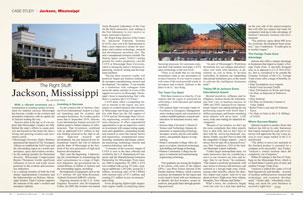
With a vibrant economy and a commitment to creating a prime environment for industry success, Mississippi has become a leader in the aviation and aeronautics industries, with its capital city of Jackson leading the way.
Success starts at the top, so it's no surprise that Mississippi's leaders are fully behind the state's efforts to create policies and incentives that foster the state's strong and growing aviation and aeronautics sector:
Mississippi Governor Haley Barbour announced the launch of The Aerospace Alliance to establish the Gulf Coast and the surrounding region as a world-class aerospace, space and aviation corridor.
As the ranking member for Homeland Security, Mississippi Congressman Bennie Thompson wields significant influence in travel and trade issues pertinent to the aviation and aeronautics industries.
As a ranking member of both the Full Senate Appropriations Committee and the Subcommittee on Defense, Mississippi Senator Thad Cochran supports the interests of the state's aviation and aerospace industry.
Investing in Success
As the aviation hub of Jackson, Jackson-Evers International Airport is a logical launching pad for aviation and aerospace businesses. So it makes perfect sense that in September 2010, Jackson-Evers International Airport received a $3 million grant to further enhance its infrastructure. That investment, combined with an additional $14.1 million in federal funding released to the state to advance high-tech research and development, has put Jackson-Evers International Airport, the City of Jackson and the State of Mississippi at the forefront of the next generation of high-tech business development.
 That's just the beginning. Underscoring the commitment to maintaining the area's preeminence in a range of high-tech industries, the government has invested billions of dollars in Jackson and the surrounding region, including:
That's just the beginning. Underscoring the commitment to maintaining the area's preeminence in a range of high-tech industries, the government has invested billions of dollars in Jackson and the surrounding region, including:
Development of equipment such as the C17 military lift and Mine-Resistant, Ambush Protected (MRAP) vehicles.
Ongoing research at the U.S. Army Engineer Research and Development Center. (In 2009, this location was named Army Research Laboratory of the Year for the third consecutive year, making it the first laboratory to ever receive so many consecutive honors.)
Dr. Roger King, director of the Center for Advanced Vehicular Systems (CAVS), says you'd be hard-pressed to find a more impressive cluster for aerospace and aviation technology, research and development anywhere else. The area's unsurpassed resources include The Stennis Space center, NASA's testing ground for rocket propulsion, and the CAVS at Mississippi State University, which is among the nation's foremost engineering, research, testing and development facilities.
"Having these resources nearby will positively impact any business looking to do aerospace manufacturing research and development," he explains. "I was recently at a conference with colleagues from across the nation, and they're in awe of the support we receive in Mississippi. Mississippi's focus is manufacturing, that's why there's a resource like CAVS here."
CAVS alone offers a compelling reason to relocate to the region: any aeronautics or aviation business that relocates to Mississippi and brings job opportunities with them has the full support of CAVS and the Mississippi State University engineering, research and development enterprise. It offers unparalleled opportunities to get an impressive return on investment with unique testing equipment and capabilities, outstanding faculty and research in areas like human factors and ergonomics, computational manufacturing, simulation and design, materials processing, technology transfer and commercialization, and more.
"A measure of the economic impact of CAVS is seen in the data collected and verified by the U.S. Department of Commerce and the Manufacturing Extension Partnership for Mississippi. From January 2006 to September 30, 2009, CAVS was credited with saving 353 jobs, creating an additional 1,283 jobs, saving $2.3 million, increasing sales of $4.3 billion with retained sales of $7.2 million, and creating $71 million in new investment," notes King.
From designing lightweight magnesium engine cradles to analyzing manufacturing processes for corrosion resistant dual-wall stainless steel pipe, CAVS takes technology to the next level.
"There is no doubt that we can bring tremendous value to any aeronautics or aviation business. If you want to connect with some of the most powerful minds in aerospace and aviation, Jackson is the place to do it," says King.
The Team You Need
With these resources so close by, it's no surprise that the region is renowned for cultivating a well-educated and trained workforce:
The Jackson State University Center of Excellence in Emergency Management unites leading experts and researchers to conduct multidisciplinary research and education for homeland security solutions.
Jackson State University's School of Science and Technology features departments in engineering technology, aerospace science, physics and mathematics, and graduate degrees in engineering.
Hinds Community College offers degrees in aviation, electrical technology, and drafting and design technology.
Holmes Community College has degrees in industrial and manufacturing engineering technology.
 "Our graduates are among the brightest in the nation, with some of the highest GPAs," says Ross Tucker, director of the Greater Jackson Alliance, which oversees economic development for the region and works hand in hand with new businesses to identify the best location, secure incentives, and guide them through permitting processes.
"Our graduates are among the brightest in the nation, with some of the highest GPAs," says Ross Tucker, director of the Greater Jackson Alliance, which oversees economic development for the region and works hand in hand with new businesses to identify the best location, secure incentives, and guide them through permitting processes.
"As part of Mississippi's Workforce Investment Act, our colleges and universities will work with business, at absolutely no cost to them, to develop curriculum. In Jackson, our outstanding educational institutions give us the means to cultivate the intelligence businesses need."
Taking Off at Jackson-Evers International Airport
Beyond incentives, influence and intelligence, Jackson boasts the infrastructure that's key to business success. In 2009 and 2010, Jackson-Evers International Airport was ranked among the top performing airports with fewer than 5 million passengers and boasts something most airports will never have: 3,345 acres, ready and waiting for industrial development.
"Because of our location, we don't get the noise complaints that other airports have to deal with, and we don't have to deal with the ‘not-in-my-backyard' syndrome. Finally, you don't have to deal with the congestion of larger airports - you're always first for take off at Jackson-Evers," says Dirk Vanderleest, CEO of the Jackson Municipal Airport Authority.
"Unlike larger metropolitan areas, we make businesses that are considering a move to our location our time and energy: they're our focus," he continues. "Our airport is perfectly positioned: with easy access to runways and taxiways, and centered in a foreign trade zone, which, among other benefits, allows for duty-free import and export. And we're just about an hour's flight away from Atlanta, Memphis, New Orleans and Dallas."
What's more, the Authority began work last year on a four-lane parkway on the east side of the airport property that will offer key airport real estate for companies looking to take advantage of Jackson's business resource-rich environment.
"The parkway opens about 600 acres for economic development lease property," says Vanderleest. "It really puts us in another league."
The Foreign Trade Zone Advantage
Jackson also offers a unique advantage to businesses that import or export: a Foreign Trade Zone. A specially designed area, in or adjacent to a U.S. Port of Entry, that is considered to be outside the Customs Territory of the U.S., Foreign Trade Zones offer a range of benefits, including
Duty Exemptions on re-exports
Relief From Inverted Tariffs
Duty Elimination on Waste and Scrap
No Duty on Rejected or Defective Parts
Duty Deferral
No Duty on Domestic Content or Value Added
Relief From Local and Ad Valorem Taxes
No Duty on Sales to the U.S. Military or NASA
Where Success Begins
Optimal location is another factor that Jackson has full on its side: businesses that require transport by road, rail or waterway will appreciate the city's easy access to every major market in the U.S. and beyond.
"The ability to move raw materials to the finished product is essential for a company to be successful," says Tucker. "Jackson's central location takes the complexity out of logistics."
Within 45 minutes is the Port of Vicksburg on the Mississippi River, which is a United States Customs port of entry and another Foreign Trade Zone.
"Jackson is indeed the center of it all both figuratively and literally - in terms of location, political power; research and technology; and economic development," Tucker adds. "Absolutely everything you need for your business to succeed is right here."


There are no comments
Please login to post comments